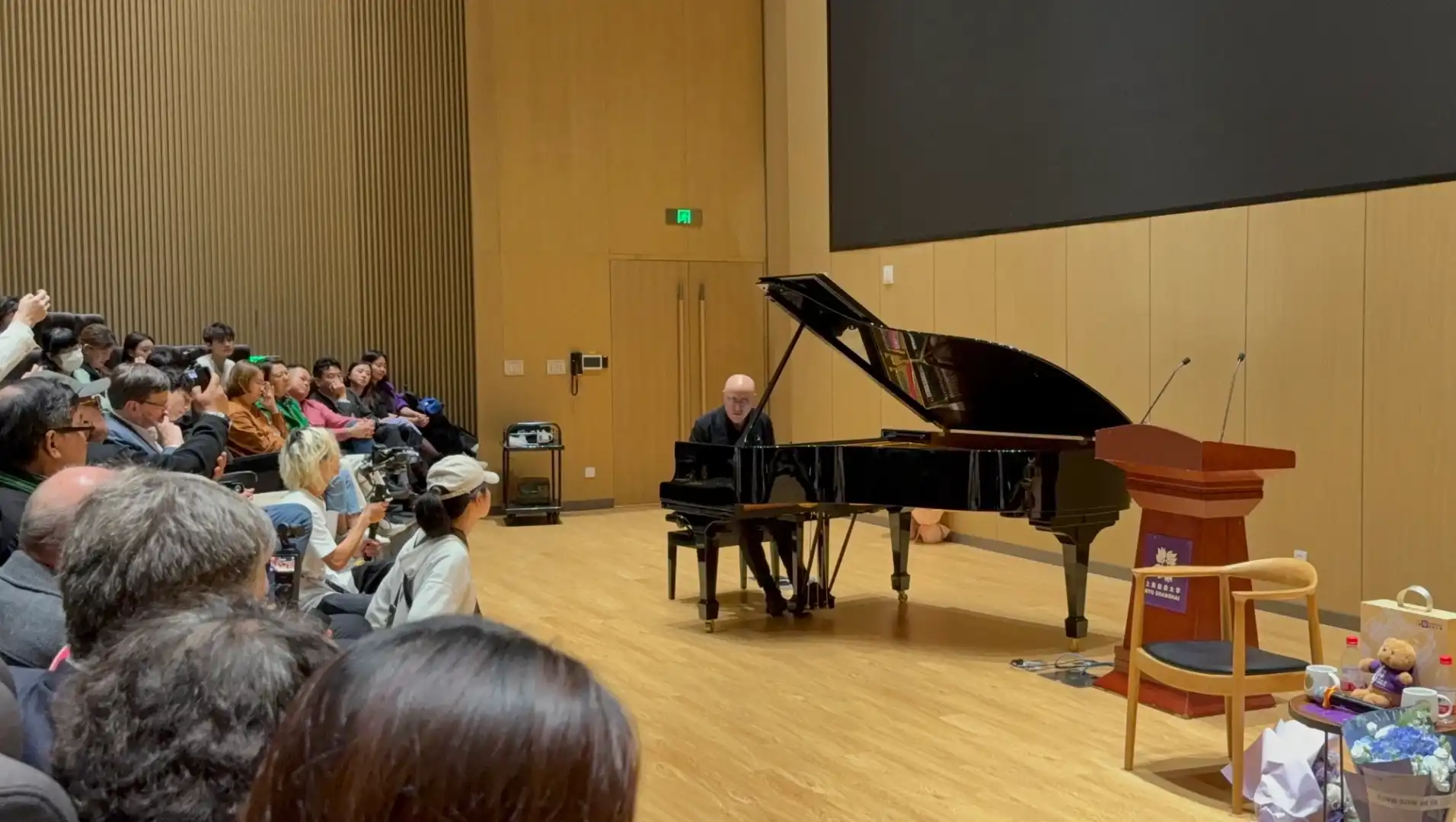From Cardboard Keys to Concert Halls: Kong Xiangdong in Conversation

Photo by Nicole Chen
World-renowned pianist Kong Xiangdong reflected on his lifelong journey from a hand-drawn keyboard to the world’s concert halls in a conversation with Jeffrey Lehman, vice chancellor of New York University Shanghai, on Nov. 6, 2025.
The discussion, part of NYU Shanghai’s Conversations with the Vice Chancellor series, gave students and faculty a candid glimpse into how imagination, discipline and curiosity have shaped one of China’s most celebrated musicians.
Kong’s earliest lessons began during the Cultural Revolution, when pianos were scarce. His mother drew a makeshift keyboard on cardboard. Laughing as he recalled it, he said she was “smarter than Steve Jobs.” That improvised start, he added, taught him that imagination could outplay limitation — a lesson that followed him throughout his career.
By 17, Kong became the first Chinese competitor in 24 years to enter Moscow’s prestigious Tchaikovsky Competition, marking China’s return to the world stage after the Sino-Soviet split.
“I was 17, competing with the big boys,” he said. “There were 137 competitors for the first round. The entire first round occupied an entire week, 12 hours every day to remember. I had to sit there to listen, and I think my early life really reminds me of all the efforts, hard work, many, many long hours of practicing that has made me feel closer to the music.” That rigor continued through his teenage years.
“I was 14 … and I started to practice like crazy. Practiced 15 to 16 hours a day, including the summer and the winter vacations,” he said. “There were one time visitors from Singapore, Malaysia, came to see how the kids are practicing. It was four degrees below zero. They walk into my practice room, see me wearing short sleeves, practicing like hell with sweat on the ground. They say, ‘Wow, how can you have so much sweat?’ I say, ‘Yes, after 10 hours, you’re gonna have.’ They touch[ed] my towel — and the towel was frozen.”
After decades of touring, Kong said his devotion gave way to exhaustion. “Being a traveling artist is not an easy life,” he said. “You travel alone, eat alone, play alone.” By 2008, loneliness deepened into depression. “I didn’t want to see anyone,” he said. “Sometimes my mother cooked for me. She had to leave the meal outside my apartment on the stool. I would make sure she returned to her apartment before I opened the door.”
Yet one constant remained. “One thing I never left was music, because as a pianist, my privilege was I always had a piano,” he said. “Sometimes I slept under the piano. When I open my eyes, the first thing in the morning I see the backbone of this big fella, I feel safer.”
It was during that period that Kong began what he called a musical portrait — improvising short pieces based on four random notes given by friends: two black keys, two white keys.
“But that’s not just music,” he said. “That’s really good fortune-telling, and your life will be within. I said, wow, that’s something special. We want to try. So, I remember the first three people, actually, two of them I know, a couple. They brought a friend, and I made three portrait pieces for them. They all cried. First person cried — I said, well, maybe she was just a lady, sentimental. Then her husband cried. I said, well, they try to make me happy. Then the third guy cried. I said, well, maybe for real. Maybe for real.”
He kept playing for visitors who showed up at his door. “So far, after how many years — 30, 40 years — I have improvised for almost 4,000 people,” he said. “My friends cried, felt emotional, felt connected. I realized music’s ability to connect souls better than any concert.”
That rediscovered connection drew the attention of neuroscientists at Tsinghua University, who invited Kong to take part in brain-imaging research on the effects of music as therapy. He performed a 90-minute improvisation while scientists recorded brain activity from both him and seven audience members. The collaboration has since grown into a three-year project studying the impact of live improvisation on patients with depression.
“It’s worth doing,” he said. “Somebody got to do it. We all end up leaving this world sooner or later. We might just find a precious opportunity to do something meaningful for this world.”
As Kong prepares to join NYU Shanghai’s music faculty, he hopes to pass on that sense of curiosity and resilience. “Loving music is a great part of your health, because that’s part of you,” he said. “Let music be your friend, be the friend of your soul, and let it be that way the rest of your life, because definitely music is such a great platform.
See also: profile story coming soon